Harrowing times
harrowing /ˈharəʊɪŋ/ adjective - acutely distressing.
These are times that rip through the fabric of the illusion of normality. What we knew in the past is no longer true. New realities will congeal, but I think that we are not yet there. We are stuck in several dilemmas.
Families are torn by the fear of economic hardship, bakeries work reduced shifts to save on the electric bill. Savings shrink by the day as inflation picks up momentum. Who can we trust?
Here in Sweden, we just had general elections, and the nationalistic populists took another stride, becoming the second largest party. They are collaborating on the right, but their rhetoric is strongly focussed on the salarymen and blue collar workers. In my municipality, this party was the largest of them all, with a third of all votes.
I think that they are excellent in framing the problems, much better than the established parties. I don't back their proposed "solutions", but I am impressed by their skill in talking about problems that ordinary people face. Maybe I am rather disappointed by the other parties apparent lack of competence.
Until today, the economic situation has been pretty good for most people, since consumption has been on record levels after the pandemic. However, the fear is rising. Petrol prices are up this year. Winter is coming. There are no easy choices for most people.
No easy choices
I also had a harrowing experience. Literally. And I am still a bit shaken.
Sven-Erik, a neighbour a few farms down the road, came by to help me fertilize and "break sod". We had 3000 m2 grassland on top of the sand soil, that I wanted to fertilize and break up, for my tree nursery.
Grass and trees are no friends, rather arch-enemies. Many grasses exude chemicals that limit the growth of trees. When trees get big, they shade the grasses until they die. It is a dog-eats-dog scenario, if we simplify quite a bit.
Therefore, I wanted to break the power of the quack-grass and prepare the soil for the upcoming planting season. But I did not want to destroy the life in the soil. A dilemma.
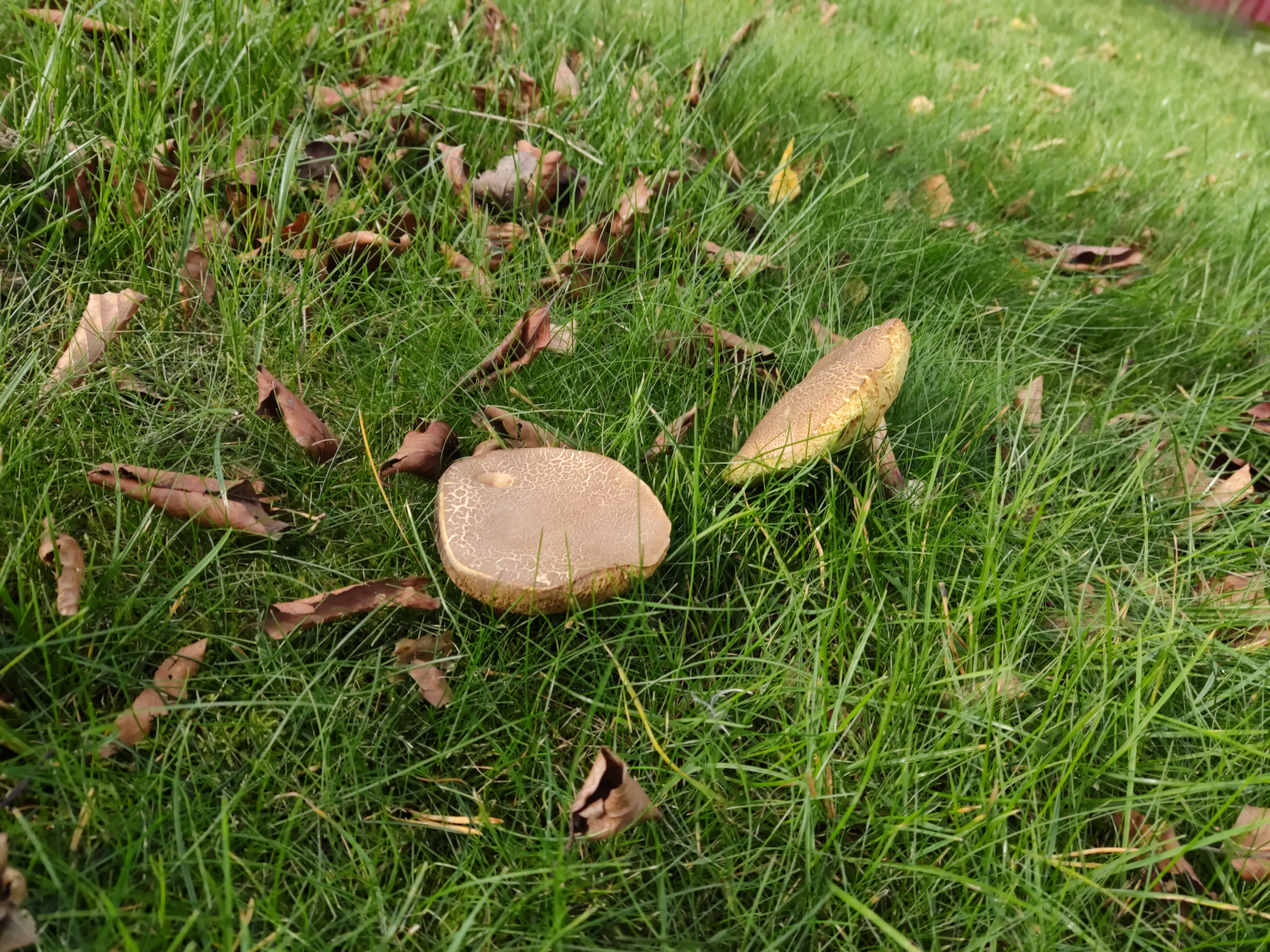
Sepia bolete - an edible mushroom - indicates healthy soil life
Our grass field has been intact for many years. The previous owners had horses who grazed the field, so the sub-soil life could flourish. We don't want to destroy this, but we also don't want the grass.
In a small area, it is possible to cover the grass with cardboard until the grasses break down and die, but our field is far too large for our supplies of cardboard. And we did not want to use RoundUp or any other poison. What should we do?
My tree nursery friends in the Netherlands had shared their experiences and based on their encouragement I had hired Sven-Erik to come by. I had asked for a "spader", which is a machine that turns the sods upside down, but nobody had one here. Sven-Erik and his friend Fredde had checked the sod and suggested to run a disk harrow and a tiller. I said yes.
I was fearful of the tiller, since the big trend in organic farming is "no-till-farming". I had read plenty of articles talking about how bad tilling is for the soil. But what alternatives are there?
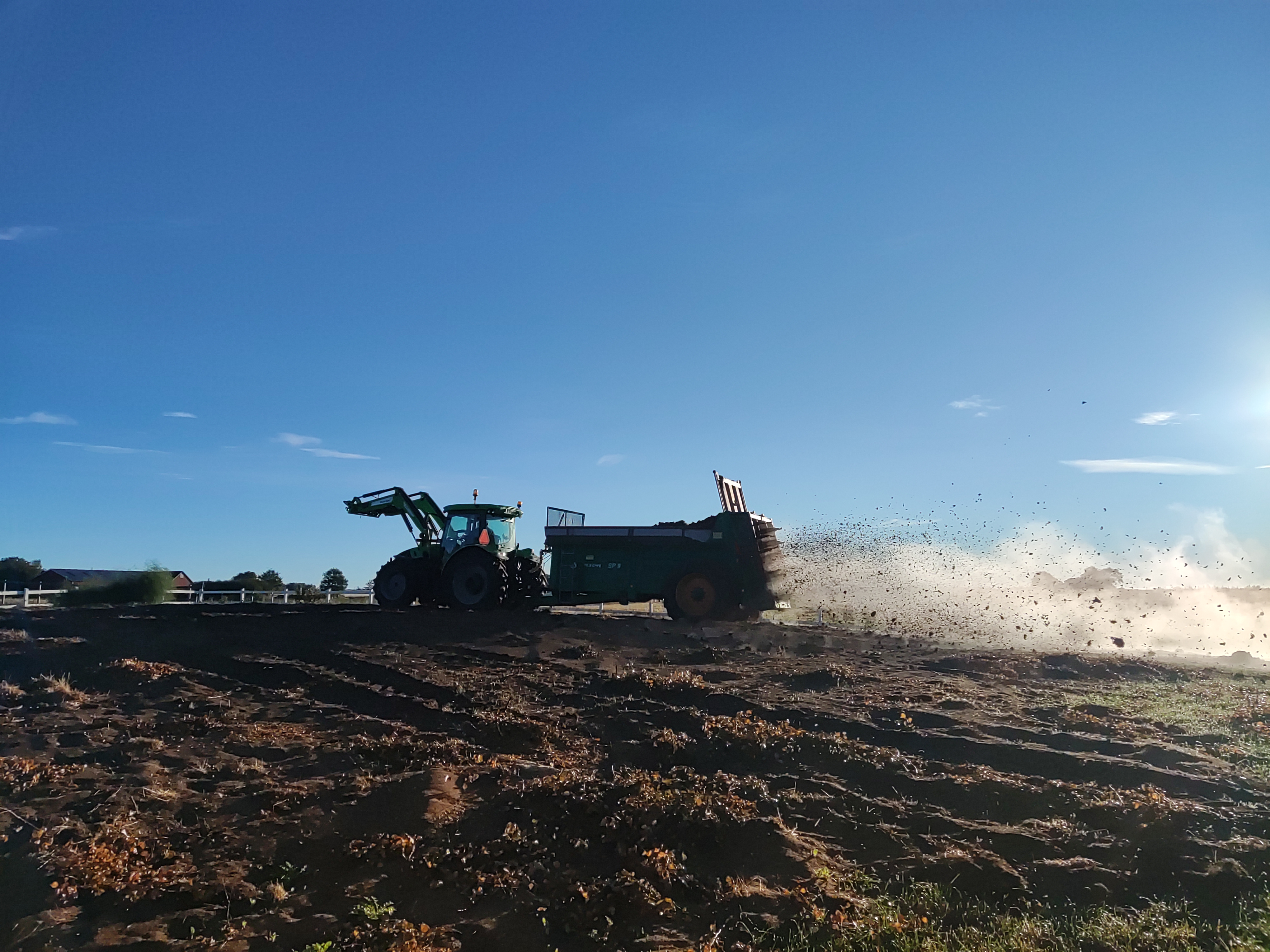
Pig shit from the Bengtsson stable.
Sven-Erik came with a huge tractor with a heavy load, spreading the manure in a thin and even layer over our field. It felt almost physical, the wave of hot manure that was flung onto the grass and the sand. And I almost felt how it would be to be a worm in our soils, when the heavy equipment was driving back and forth, compacting the ground.
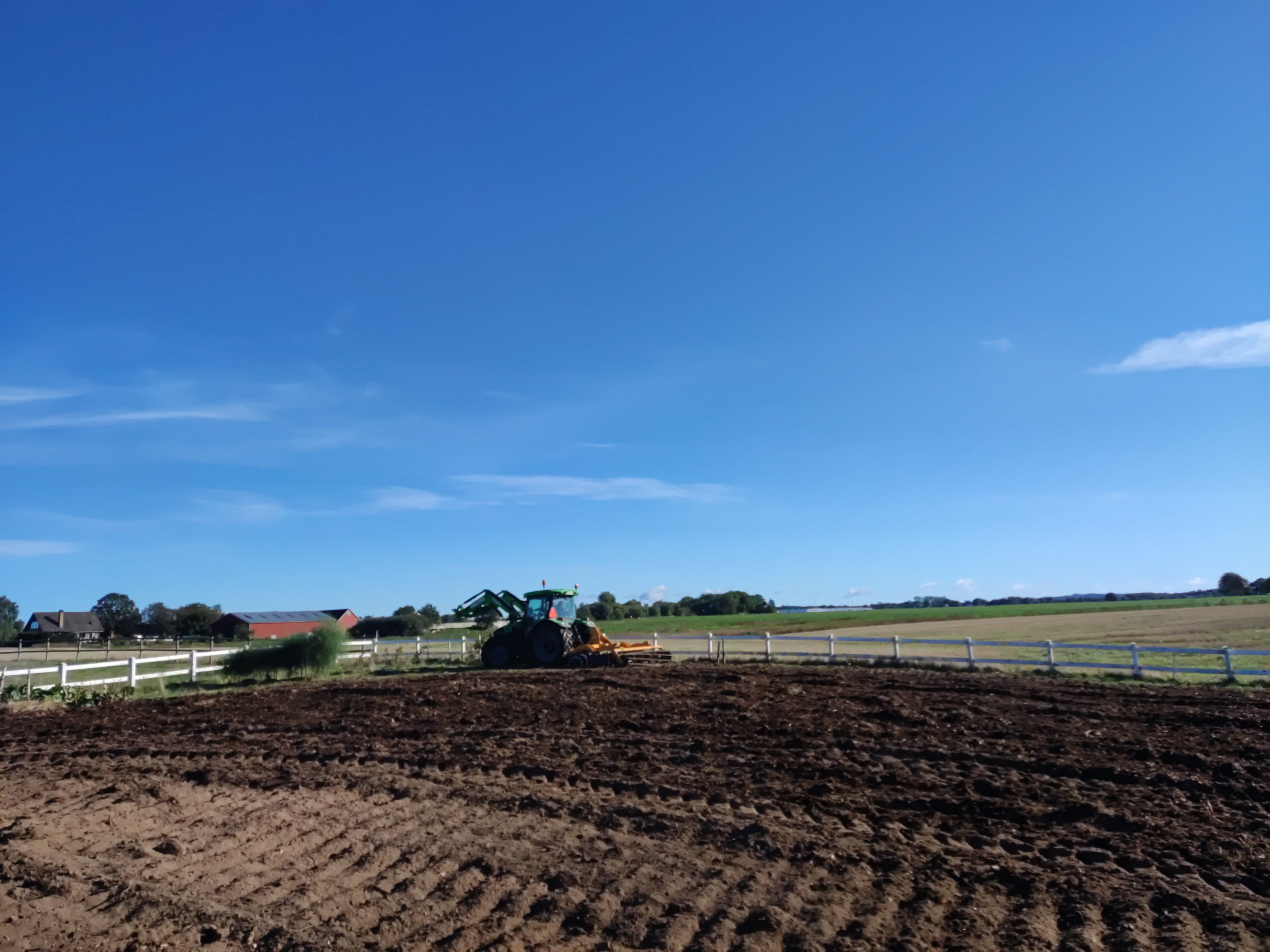
Disk harrowing our fields
The ripping apart of the sod was done with a disk harrow. The rotating diagonal disks tear the sod into long, thin strips. Now the white roots of quack grass came to the surface in dangling spaghetti-bunches.
I suddenly realized why "harrowing" has a metaphorical meaning.
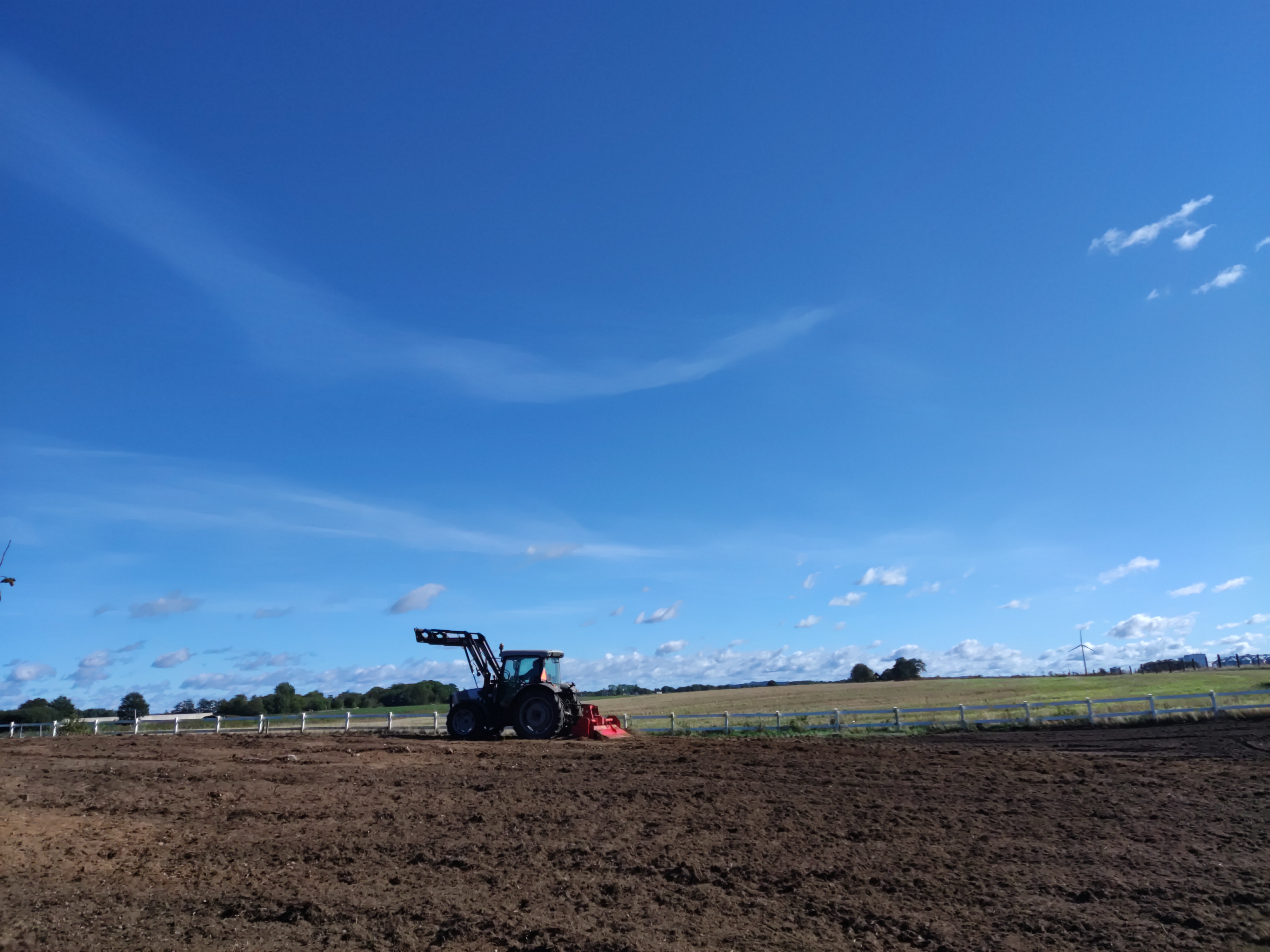
The tractor tiller shredded everything
The tiller runs like a horizontal-axis pulverizer. The previously hard sod was shredded into a fluffy, 25cm thick layer of sand-soil. The consistency seems like soft-ice. The top 25 cm is very, very fluffy, and difficult to walk in, impossible to run a wheelbarrow.
Below this, there is a hard layer. Maybe the infamous "hardpan"-layer?
When I dig with a shovel, it is very soft and easy going the first spade-depth, but then it is very compacted and quite hard to dig.
Will this recover? How long will it take? Do I need to get a broadfork/grelinette to break the deeper soil? I have so many questions and so few answers, since I run the operation very differently compared to my neighbours.
I hope this is the last time I have heavy machinery on our soils. The intention is to only run the 2-wheel tractor from now on, so that the soil can recover.
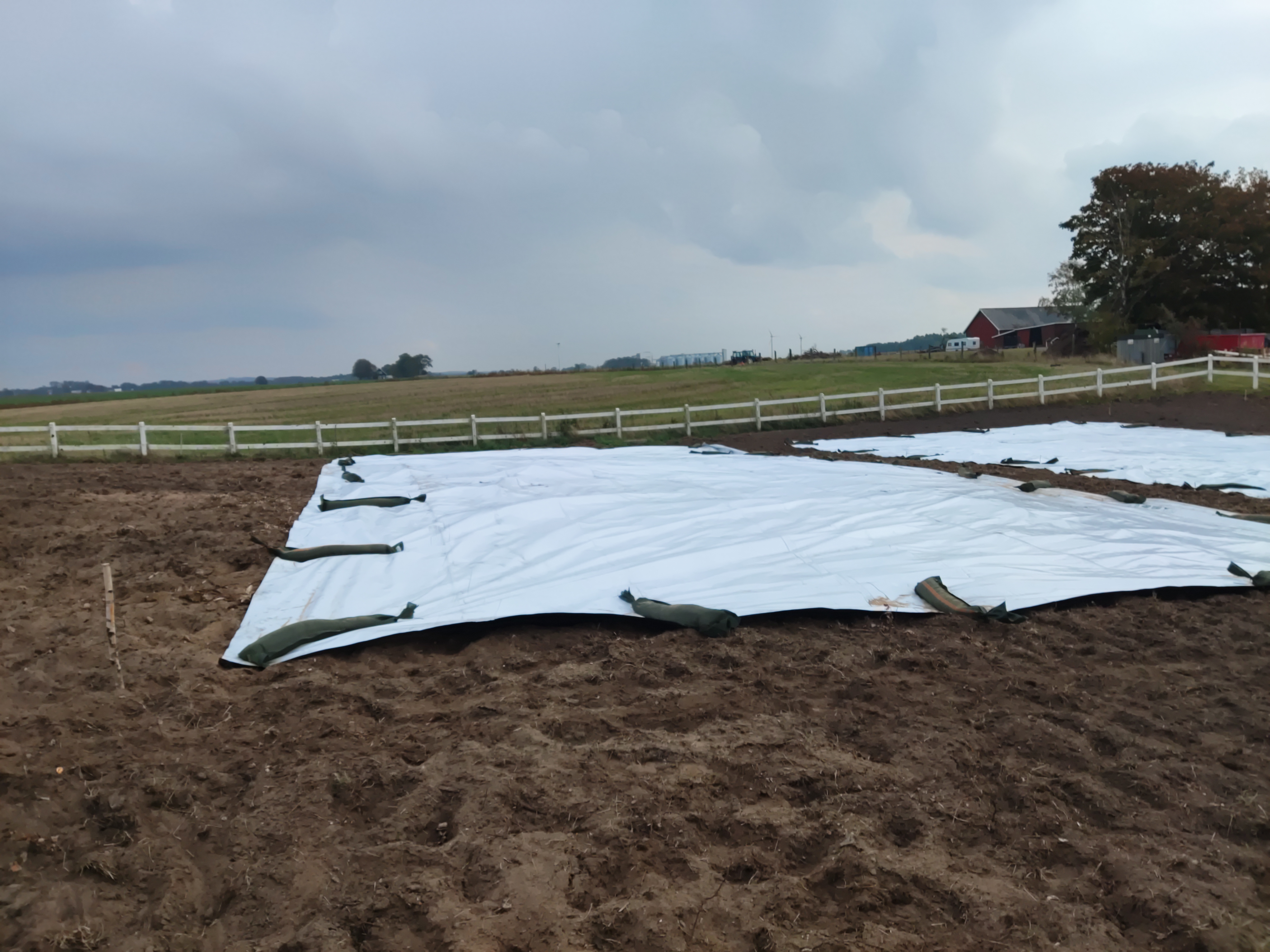
Some of the sub-fields are now covered with plastic until I get the trees and rootstock to plant here
As an experiement on how to get rid of quack-grass, I purchased silage tarps to cover the ground with. Until I get my first trees in December, I cover two of the sub-fields (10x20m) with silage tarps and sand sacks. I hope they will not fly away in the next storm...
And the plastic is another dilemma. I want to work without fossil fuels. Without petroleum inputs. Is it worth it to use plastic silage tarps to reduce the amount of soil disturbance and tilling? How do I know?
I have many questions, regarding how the ecology will work out in our soils. Also many questions on how we can grow enough food and produce on small farms in the upcoming years. I very much agree to the analysis of Chris Smaje that a is necessary, but I struggle to formulate how to get there.
On the farm, as well as in the larger society, we try to improve things, but we often don't know all the consequences of our actions.
How can we know that our actions take us closer to our goals?